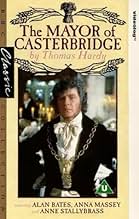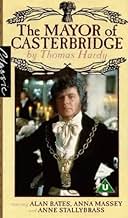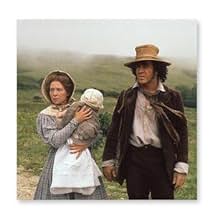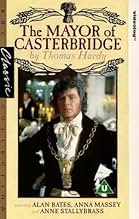CALIFICACIÓN DE IMDb
7.9/10
403
TU CALIFICACIÓN
Agrega una trama en tu idiomaDrunken Henchard sells wife at fair. Sober, he reforms, becomes mayor but past catches up when wife returns years later.Drunken Henchard sells wife at fair. Sober, he reforms, becomes mayor but past catches up when wife returns years later.Drunken Henchard sells wife at fair. Sober, he reforms, becomes mayor but past catches up when wife returns years later.
Explorar episodios
Opiniones destacadas
A classic ancient BBC production: promising actors with a sparsely populated script, indecipherable accents, atrocious sound quality, and Extremely Long Takes Wherein Nothing Really Happens.
Potentially deeply emotional scenes are read through instead of explored. It's as if the text of the script is so sacred the actors daren't internalize it for fear of desecrating it.
Confusing jumps in time compound the badness. In addition, by trimming some exposition, we're not quite sure what transpires between some characters, or if we do know What, we're never sure Why.
This is an excellent soporific. It also works well if you need to exercise your thumb on the fast-forward button. It's difficult to miss an important piece of dialogue or even a scene. If "torpid" is what you're looking for, this is the mini-series for you.
Potentially deeply emotional scenes are read through instead of explored. It's as if the text of the script is so sacred the actors daren't internalize it for fear of desecrating it.
Confusing jumps in time compound the badness. In addition, by trimming some exposition, we're not quite sure what transpires between some characters, or if we do know What, we're never sure Why.
This is an excellent soporific. It also works well if you need to exercise your thumb on the fast-forward button. It's difficult to miss an important piece of dialogue or even a scene. If "torpid" is what you're looking for, this is the mini-series for you.
10stancym
10 is not a high enough rating for this masterpiece. Even as we see the gorgeous and extremely talented Alan Bates as the mayor, making mistake after mistake, acting like a fool, struggling with his conscience, and sometimes making things right only to screw up again, we are moved by him. We have pity for a man who cannot get out of his own way, who is his own worst enemy.
The acting is superb, the scenery/sets beautiful and fitting of the time and place. Often meanings are conveyed through looks, expressions, and not an excess of words. The score by Carl Davis is appropriate and adds to the feel of the series, enhancing the whole thing.
What luck that this is on DVD, complete with biographies on Sir Alan Bates and Thomas Hardy, among other things. Don't miss this gem.
The acting is superb, the scenery/sets beautiful and fitting of the time and place. Often meanings are conveyed through looks, expressions, and not an excess of words. The score by Carl Davis is appropriate and adds to the feel of the series, enhancing the whole thing.
What luck that this is on DVD, complete with biographies on Sir Alan Bates and Thomas Hardy, among other things. Don't miss this gem.
This grim BBC miniseries is hard on ears belonging to non-British viewers who aren't already familiar with the Thomas Hardy source novel, so thick are the regional accents, so muffled is the soundtrack, and so lackadaisically introduced are some of the plot developments. Whether you can understand all of his utterances or not, Alan Bates gives a robust performance in the lead, his second foray into Hardy territory, several years after his incarnation as sheep farmer Gabriel Oak in John Schlesinger's "Far from the Madding Crowd." Henchard is far less appealing than Oak and it's difficult to warm to such a man although you can respect him for rising from the mess he makes of his youth to prominence and commercial success in middle age. Bates barks most of his lines as if to emphasize his character's simplicity and lack of finesse. His outbursts of rage and drunken excess are brilliantly effective. There is nothing likable about him but we can empathize with his plight, that of an ordinary man with strengths and weaknesses who was unlucky enough to make a major mistake early in life that eventually overshadowed all that was to come.
This adaptation by Dennis Potter takes some liberties with the twisty, coincidence-laden plot, and not always to good effect, though it's hard to tell how much was written out as opposed to how much was cut after shooting. The casting of supporting roles is apt; these are not glamorous people, but ordinary rural folk of the mid-19th century, and all of the actors who play these roles fully bring their homely characters to convincing and persuasive life, aided by the liberal use of closeups and long takes. Jack Galloway is particularly impressive as goodhearted, trusting Donald Farfrae, the Scotsman who is forcefully befriended by Henchard, only to become his undoing. Strangely, the germination and blossoming of their relationship, so clearly laid out in the novel, is skipped and introduced full-blown like an afterthought, which not only removes the fatalistic element but becomes another of several inexplicable plot shifts that viewers must accept as a given. The piling up of these arbitrary developments weaken the presentation. Like Schlesinger's "Crowd" before it, the physical production convincingly replicates the era in question, down to costume and furnishings and the population of grizzled locals seen at pubs and markets and stables. Interiors look like they were shot in the actual cramped, underlit, claustrophobic dwellings the characters inhabited. Carl Davis's somber, spare score complements the tone without getting in the way.
A boom mike is clearly visible in one parlor scene and shadows of booms appear occasionally in other scenes. At times characters run over each other's lines in a way that mimics actual non-rehearsed speech but could also be gaffes that were left intact due to budget or schedule concerns. On the whole it looks like a modestly financed production whose every penny was wisely invested in the period furnishings and costumes. Good use is made of the melancholy, windswept countryside.
This adaptation by Dennis Potter takes some liberties with the twisty, coincidence-laden plot, and not always to good effect, though it's hard to tell how much was written out as opposed to how much was cut after shooting. The casting of supporting roles is apt; these are not glamorous people, but ordinary rural folk of the mid-19th century, and all of the actors who play these roles fully bring their homely characters to convincing and persuasive life, aided by the liberal use of closeups and long takes. Jack Galloway is particularly impressive as goodhearted, trusting Donald Farfrae, the Scotsman who is forcefully befriended by Henchard, only to become his undoing. Strangely, the germination and blossoming of their relationship, so clearly laid out in the novel, is skipped and introduced full-blown like an afterthought, which not only removes the fatalistic element but becomes another of several inexplicable plot shifts that viewers must accept as a given. The piling up of these arbitrary developments weaken the presentation. Like Schlesinger's "Crowd" before it, the physical production convincingly replicates the era in question, down to costume and furnishings and the population of grizzled locals seen at pubs and markets and stables. Interiors look like they were shot in the actual cramped, underlit, claustrophobic dwellings the characters inhabited. Carl Davis's somber, spare score complements the tone without getting in the way.
A boom mike is clearly visible in one parlor scene and shadows of booms appear occasionally in other scenes. At times characters run over each other's lines in a way that mimics actual non-rehearsed speech but could also be gaffes that were left intact due to budget or schedule concerns. On the whole it looks like a modestly financed production whose every penny was wisely invested in the period furnishings and costumes. Good use is made of the melancholy, windswept countryside.
A thoughtful TV production, running over six hours, and a fine adaptation of Thomas Hardy's novel, arguably his best Wessex tale. Casterbridge stands for the real-life Oxford, a town where dreams can happen and a man such as Michael Henchard can rise as high as man can climb, and fall as far as man can sink. He is a tragic hero, a towering tour-de-force of good and evil, fearlessness and folly, and is beautifully played by Alan Bates in this version.
In support, Anne Stallybrass and Anna Massey shine the most, with Jack Galloway going some way to give life to the dour and ambitious Scot Farfrae, but stopping short of illuminating his complexities as set out in the book.
The music and the settings of this adaptation are excellent, and the atmosphere of a farm town, not yet touched by anything beyond industrialisation, is richly drawn. Slow-paced, but satisfying, this drama's reputation has grown steadily, and it is well deserved.
Interestingly, the adaptor of Hardy's book is none other than TV's infant terrible, Dennis Potter, and it is interesting to compare 'The Mayor of Casterbridge' with the likes of 'Pennies from Heaven' or 'The Singing Detective'.
In support, Anne Stallybrass and Anna Massey shine the most, with Jack Galloway going some way to give life to the dour and ambitious Scot Farfrae, but stopping short of illuminating his complexities as set out in the book.
The music and the settings of this adaptation are excellent, and the atmosphere of a farm town, not yet touched by anything beyond industrialisation, is richly drawn. Slow-paced, but satisfying, this drama's reputation has grown steadily, and it is well deserved.
Interestingly, the adaptor of Hardy's book is none other than TV's infant terrible, Dennis Potter, and it is interesting to compare 'The Mayor of Casterbridge' with the likes of 'Pennies from Heaven' or 'The Singing Detective'.
Please pardon the substandard Americanism, but "who'd a thunk" that the insanely imaginative bete noire of British television writing, Dennis Potter, could have written such a disciplined, book-faithful, beautifully-paced script as this. He pays full and respectful homage to the great Thomas Hardy's masterpiece.
No repetition of the accolades of prior reviewers is needed here. They're spot on.
What I would like to see, if I had control of casting of both the 1978 and 2003 versions, is a redistribution of the cast. For this exercise, I need a time warp.
Understanding, for example, that Polly Walker, who plays Lucetta in 2003, was only 12 years old in 1978, I would have preferred her (as she was in 2003) to Anna Massey as Lucetta in 1978. Walker has some beauty and magnetism and is believable as a man- hungry "fallen woman." Massey was undeniably an excellent actress, but as a vamp she simply can't cut it. To think Farfrae or Henchard could be attracted to her sensually is laughable. The suspension of disbelief here is too much for me to make. (By the way, her miscasting as Laura in the Pallisers is equally disturbing, as there is NO spark between her and Donal McCann in that series.)
Then I'd grab Juliet Aubrey out of the 2003 version and cast her in place of Anne Stallybrass - Aubrey portrays Susan more sensitively, more skilfully.
Janet Maw is superb as Elizabeth-Jane, so I'd leave her there, and not import Jodhi May into 1978 - May is too stilted as E-J. Both Purefoy and Galloway are very good as Farfrae, but Goodman is so very good in the minor role of Jopp that I would pull him out of 2003 to replace Lacey,
And last, I leave it to you as to Hinds or Bates as Henchard. They both turn in the most remarkable performances of their careers in Mayor of C. And that's why it's such a pleasure to watch both versions. despite the dreadful editing of Hardy in 2003.
No repetition of the accolades of prior reviewers is needed here. They're spot on.
What I would like to see, if I had control of casting of both the 1978 and 2003 versions, is a redistribution of the cast. For this exercise, I need a time warp.
Understanding, for example, that Polly Walker, who plays Lucetta in 2003, was only 12 years old in 1978, I would have preferred her (as she was in 2003) to Anna Massey as Lucetta in 1978. Walker has some beauty and magnetism and is believable as a man- hungry "fallen woman." Massey was undeniably an excellent actress, but as a vamp she simply can't cut it. To think Farfrae or Henchard could be attracted to her sensually is laughable. The suspension of disbelief here is too much for me to make. (By the way, her miscasting as Laura in the Pallisers is equally disturbing, as there is NO spark between her and Donal McCann in that series.)
Then I'd grab Juliet Aubrey out of the 2003 version and cast her in place of Anne Stallybrass - Aubrey portrays Susan more sensitively, more skilfully.
Janet Maw is superb as Elizabeth-Jane, so I'd leave her there, and not import Jodhi May into 1978 - May is too stilted as E-J. Both Purefoy and Galloway are very good as Farfrae, but Goodman is so very good in the minor role of Jopp that I would pull him out of 2003 to replace Lacey,
And last, I leave it to you as to Hinds or Bates as Henchard. They both turn in the most remarkable performances of their careers in Mayor of C. And that's why it's such a pleasure to watch both versions. despite the dreadful editing of Hardy in 2003.
¿Sabías que…?
- TriviaThis was one of the first major British television dramas to be shot entirely on videotape, using the new generation of portable video cameras and equipment for location footage. However, it was by no means the first BBC drama to do this, as series such as Doctor Who (1963) and Survivors (1975) had already used video for location footage as early as 1974-75.
- ConexionesEdited into Masterpiece Theatre: The Mayor of Casterbridge: Part 1 (1978)
Selecciones populares
Inicia sesión para calificar y agrega a la lista de videos para obtener recomendaciones personalizadas
- How many seasons does The Mayor of Casterbridge have?Con tecnología de Alexa
Detalles
Contribuir a esta página
Sugiere una edición o agrega el contenido que falta

Principales brechas de datos
By what name was The Mayor of Casterbridge (1978) officially released in Canada in English?
Responda


































